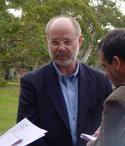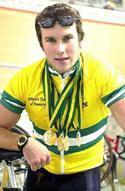Special Edition News for June 19, 2004Australia's track cycling doping scandal:
French faces blowtorch from sports authoritiesBy Gerard Knapp
The pressure is now on Australian track cyclist, Mark French, to allow authorities to use statements he provided in-camera to the Court of Arbitration for Sport (CAS) earlier this month to further investigate a highly damaging doping scandal that is enveloping Australian cycling. During testimony at CAS on June 3, 4 and 7 this year, French said another five cyclists had used his room at the Australian Institute of Sport's facility in the Adelaide suburb of Del Monte from June to December 2003, for injections of substances ranging from vitamins to equine growth hormone. While French denied he had used the illegal substances, an earlier investigation had found him guilty of possession of illegal substances and he was subsequently issued with a $1000 fine and suspended for two years (see report). But at the CAS hearings French provided more detail of the practices and named five other athletes and unless Cycling Australia can quickly determine who is and is not guilty of doping, it appears that all five could be prevented from representing Australia at the Athens Olympics, even if they qualify for final selection. Indeed, two of the riders are said to be 'gold medal prospects'. (The only riders to be implicated in this affair are those who attended the AIS during the period from June to December, 2003, which excludes Australian professional cyclists who raced in Europe or the USA in that period.) The issue escalated today after the Australian Olympic Committee (AOC) weighed into the controversy and said it would stop the participation of any athlete under suspicion of doping. "We have approximately 470 athletes in the team, we can't allow their reputations to be sullied by five possible drug cheats," said the AOC's legal counsel, Simon Rofe. "Cycling Australia has a duty to inform us of its doping prosecutions and the outcomes of them," Rofe said. "For this to have gone on for so long without us knowing the seriousness of the allegations is a matter of concern."
The CEO of Cycling Australia, Graham Fredericks, said the federation had written to French's solicitors in June 11 requesting access to legally use his information. "We do need Mark to give us permission to use the statements he made in court," he said today at a press conference at North Sydney Oval. Further, the chief executive of the Australian Sports Commission, Mark Peters, said in a statement today, "I urge Mr French to now make that information available to us so we can act on it". Peters said, "Since this issue began back in December last year, the ASC's hands have been tied by the persistent refusal of Mr French to make anything but general allegations against other cyclists on the AIS program. "He has now given specific evidence in closed hearing to the Court of Arbitration for Sport but under the rules of CAS we cannot use that information without the approval of all relevant parties involved in the case. "Mr French has not responded to our lawyer's written request of June 11th to make that information available to us so we can immediately institute a further independent inquiry, if that is what's required." Fredericks did attend the closed hearings of CAS earlier this month and does know the names of the five riders, however, he is prevented from releasing those names or carrying out further investigations unless French allows his evidence to be used in a legal context. This bureaucratic process involved in administering penalties and justice in the Australian sporting system seemingly places the authorities at the mercy one athlete, who today at least, was not talking to the media. Fredericks told the media "his (French) solicitors could have a letter on my desk by Monday morning", but gave no firm indication that he will be granted access to French's statement. Insufficient evidence Further, the embattled CEO said it was going to be difficult to prove which athlete or athletes had used the "more serious substance" of equine growth hormone. He said that two previous investigations had found "insufficient evidence" to identify who had used EGH or other illegal substances. And it appears there's little chance of forensic science experts solving the case, CSI-style. Fredericks said, "the advice we received from the relevant police authority at the time was that nothing would be able to be gleaned … that could be used in any legal sense". According to Fredericks, not even fingerprints and DNA methods can be used in this case to help determine who used the dope, so the only possible scientific assistance could be in the proposed test for growth hormone, but Fredericks was not aware of when this test would be made available. CA has only three weeks to clear up the matter as it has to name the final cycling team by July 9 and although no other names have been mentioned, it would appear the five riders do include members of the current shadow Olympic squad. Cycling Australia's only real chance is for French to grant access to his statements and then seek corroborating evidence from a third party that can identify the rider/s who used the EGH - and also clear the names of the other riders. It could be termed a search for a scapegoat, except Fredericks has promised that any rider or riders found guilty of doping would be "taken to the cleaners". Political context Despite the incriminating evidence of systemic doping, there is also a theory circulating that cycling has become a pawn in a major political row in Australia, and not only because it's an election year. It's believed the Australian Olympic Committee (AOC) is using this case as a political weapon against the Australian Sports Commission, in much the same way that the Federal Opposition leader in the Senate, the ALP's John Faulkner, used the opportunity to grill his counterpart, Senator Rod Kemp in the Senate yesterday, and score political points in the process. It certainly worked on that front, as the Australian media was dominated today with reports surrounding the French affair. It was the front-page lead story in newspapers and high up in the network TV 6 o'clock news bulletins. An Olympics year has special significance for Australian sports administrators, as it is the once-in-four-year opportunity that minor sports in the country achieve a high profile in the ball-sport-dominated local media. Added to this is that the AIS - where the alleged doping practices took place - is a Federally-funded operation. It's understood that the Australian Sports Commission (ASC) - chaired by Peter Bartels, a former champion track cyclist who became a captain of industry as CEO of a major retail organisation in Australia - is extremely annoyed that the ALP was given access to the report prepared by the CAS arbitrator, Malcolm Holmes, that had not been made public. But the contents of this report - and even detail that was not contained in the report - formed the substance of Senator Faulkner's attack in the Senate yesterday (see excerpts). Consequently - in a move that will only further highlight the case - the Opposition demanded the establishment of an independent enquiry into the whole AIS track cycling program. "The AIS's duty of care for this young cyclist and his sporting career has been completely neglected," Senator Faulkner said yesterday. A short stroll Further, a story in the Sydney Morning Herald today included an excerpt of French's actual statement to the CAS hearing earlier this month, describing how he and another rider purchased the supplement Testicomp - which contains glucocorticosteroid - from a chemist that was only one kilometer from the Australian track team's European training base in Buttgen, Germany. "So we walked down the road there and there was a chemist and just one day we were walking down and he said, 'That's where you get it', and he went in and got some himself. I went in and asked for a box of it - it comes in a box of 100 - and half was for (a third athlete)," says the report. The Herald report also told of how French only learned about doping after he started attending the AIS. Apparently a senior rider had overheard a conversation between French and the head coach, when the four-time junior world champion asked if he could receive a vitamin B injection to assist with his recovery. Apparently the coach referred the matter to the team doctor, but it's not known if the rider was advised against injecting anything, legal or not. A senior rider apparently overheard the discussion and then offered to provide French with vitamin B, with French receiving an injection in that rider's room the following evening. So began French's downward spiral, with his room eventually used by the five other riders for injecting a variety of substances. Fredericks said no AIS athlete is allowed to inject anything without approval and knowledge of the AIS medical staff. If a rider if found to be injecting even vitamins, the rider is reprimanded and in fact, the AIS has sent letters of reprimand to the five other unnamed athletes. But it was the discovery that among the used syringes, swabs and ampoules found by cleaners in French's room last December, there was equine growth hormone, an illegal substance that elevated the case into serious doping territory. The problem that existed and is now being addressed by CA is proving who actually used the EGH, and it's expected that the matter could escalate even further if left unresolved. The AOC has threatened to block the participation of all five riders in the possible track cycling squad, which in turn could lead to further legal challenges from those riders tarred with the same brush. Kersten - don't look at me One rider quick to distance himself from the AIS controversy is Ben Kersten, the 22 year old cyclist from the St. George Cycle Club in Sydney. Kersten is hopeful of making the Australian Olympic team to Athens, and today he stated he had no involvement in the drug scandal that has rocked Australian cycling. Kersten, a former member of the AIS team in Adelaide up until 18 months ago, said he has been training in Sydney for the past year with the support of the NSW Institute of Sport. Over the period of the five months that the drug allegations took place, Kersten did not train or compete in Adelaide. He supported the need to eliminate any cyclist from competition and from the national team if they have taken banned substances. He said, "They are not just denigrating the sport, but cheating on themselves, their team mates and their opponents". Kersten is a triple world junior champion who missed out on competing in the Sydney Olympics - despite winning the Australian track cycling titles that year - has been working hard to force his way into the Athens squad after narrowly missing selection following the Track Cycling World Championships in Melbourne last month. Kersten's recently improved speed from a standing start has put him in contention to make Australia's team sprint squad. Kertsen is aiming to make the three-rider team and has worked on his standing start times over 250 to improve the team's chances in the one-lap-per-rider, 750-metre event that is regularly decided by thousands of a second. Last week he set a new national record in the 250 metre standing start (see story) and is continuing his training to hopefully make the Athens squad. With the latest revelations, it would appear that Kersten has an even greater chance of heading to Greece this August. (All rights reserved/Copyright Knapp Communications Pty Limited 2004) |

|
January 2009 |
Recently on Cyclingnews.com |


